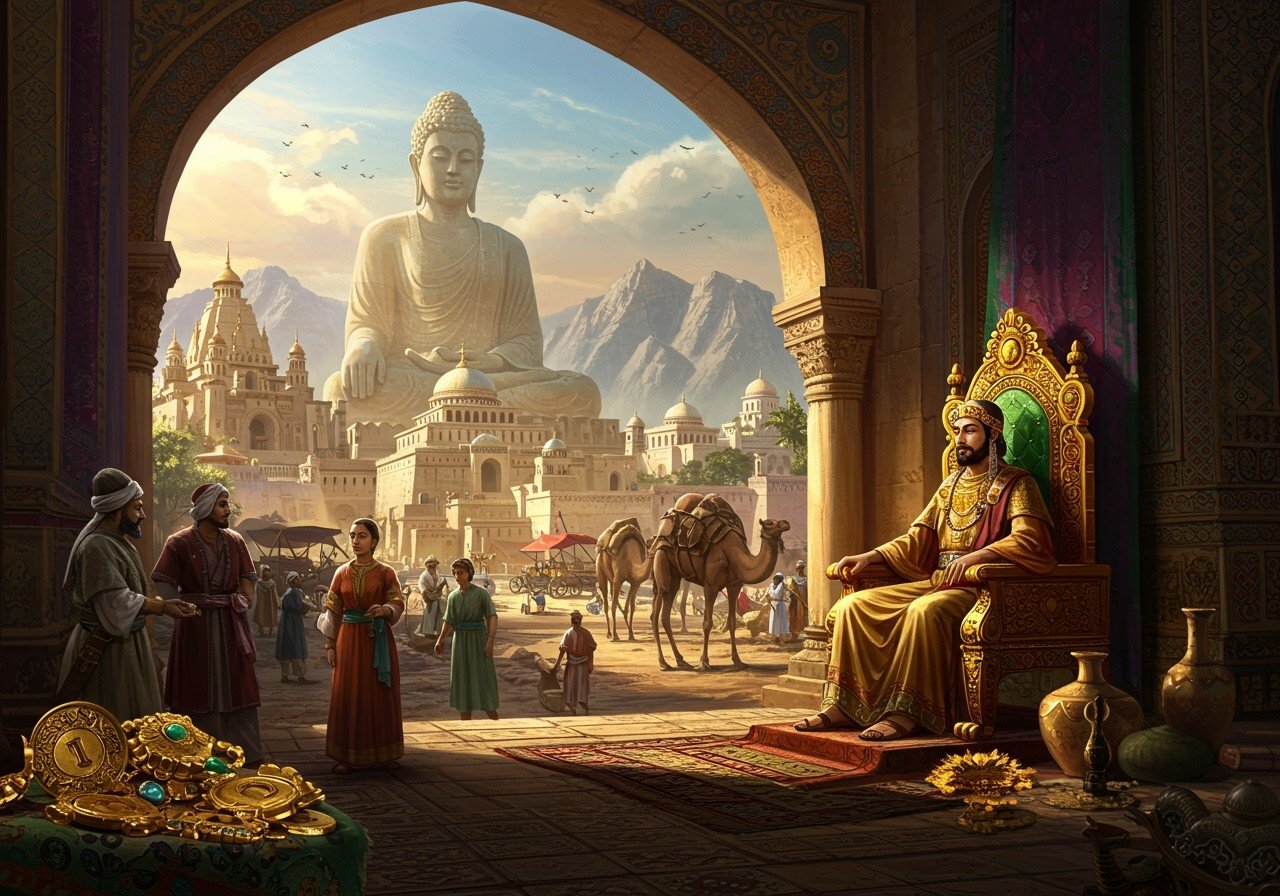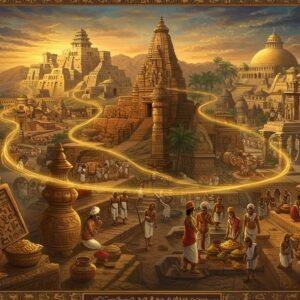
The Kushan Empire, established by the Yuezhi in the early 1st century CE, played a pivotal role in shaping the cultural and religious landscape of Central Asia and Northern India. This empire, spanning regions now known as Tajikistan, Uzbekistan, Afghanistan, Pakistan, Eastern Iran, and Northern India, reached its zenith between 105 and 250 CE. Its significance lies in its facilitation of trade, cultural exchange, and the propagation of Buddhism.
The Rise and Fall of the Kushans
Originating from the Yuezhi migration from western China, the Kushan dynasty consolidated power under Kujula Kadphises. Subsequent rulers like Vima Taktu and Kanishka the Great expanded the empire, establishing a robust administrative system and military strength. This allowed them to control vital trade routes and interact with powerful neighbors such as the Parthians and the Han Dynasty. However, attacks from the Sassanians and the Guptas around 375 CE led to the empire’s fragmentation and eventual collapse.
Economic and Cultural Influence
The Kushan Empire’s control over key sections of the Silk Road significantly boosted trade, connecting China, the Roman Empire, Sassanid Persia, and the Aksumite Empire. This facilitated the exchange of commodities like silk, spices, precious metals, and gemstones, leading to flourishing urban centers and economic prosperity. The introduction of gold and copper coinage further streamlined trade and left a lasting impact on the region’s economy.
Beyond trade, the Kushan Empire played a crucial role in disseminating Buddhism across Asia. Royal patronage, particularly under Kanishka the Great, led to the construction of monasteries and stupas, fostering the spread of Buddhist texts and teachings. The empire’s religious tolerance allowed diverse faiths to coexist, resulting in a rich syncretism of cultures. This era also witnessed the flourishing of Gandhara art, a unique blend of Greek, Persian, and Indian artistic influences, further enriching the cultural tapestry of the region.
Scientific and Technological Advancements
The Kushan period also witnessed notable advancements in science and technology. Scholars contributed to fields like astronomy and mathematics, often influenced by Hellenistic knowledge. Medical knowledge, particularly in herbal medicine, saw significant progress. Innovations in metallurgy and craftsmanship also emerged, alongside improvements in infrastructure, including roads and irrigation systems, showcasing the empire’s focus on technological development.
The Kushan Legacy
Despite its eventual decline, the Kushan Empire left an enduring legacy. Its influence on art, architecture, religious practices, and trade shaped the cultural and historical trajectory of India and Central Asia. Even after the empire’s fall, its cultural and religious impact persisted, influencing successor states like the Gupta Empire. The Kushan Empire’s unique position as a cultural bridge between East and West continues to fascinate scholars and historians, highlighting its lasting significance in world history.
Poojn’s Connection to Kushan Heritage
At Poojn.in, we offer authentic ritual items that connect to the rich cultural heritage of the Kushan period, when Buddhism and Hinduism flourished together. Our collection includes:
- Pure copper and brass items that reflect the metalwork traditions prevalent during the Kushan era. We offer a wide variety of puja items crafted from these metals, including lamps, statues, and ritual vessels.
- Traditional incense and dhoop materials similar to those used in ancient Buddhist and Hindu temples. Experience the authentic aromas used in ancient rituals with our selection of high-quality incense.
These items help modern practitioners maintain a connection to the ancient spiritual traditions that flourished during the Kushan Empire. Each product at Poojn.in is carefully selected to meet traditional specifications while offering the convenience of online shopping. Visit our website to explore our collection of authentic ritual items that honor this important historical period. You can also find specific items related to deities worshipped during that era, such as:
- Ladoo Gopal Statues: Beautifully crafted statues of Ladoo Gopal, a form of Krishna, are available in various sizes and materials.
- Radha Krishna Idols: Exquisite Radha Krishna idols, symbolizing divine love and devotion, are perfect for home altars and temples.
FAQs: Kushan Empire’s Significance
What defined the Kushan Empire? The Kushan Empire was a powerful ancient realm flourishing between the 1st and 3rd centuries CE, encompassing regions across present-day India, Pakistan, Afghanistan, and Central Asia. Its influence extended far beyond its geographical boundaries, impacting trade, culture, and religion across a vast area.
Why was the Kushan Empire considered important? The empire’s importance lies in its role as a cultural bridge, facilitating the transmission of Buddhism eastward and fostering trade along the Silk Road. This cultural exchange significantly impacted the development of societies across Asia.
What were some of the key achievements of the Kushan Empire? The Kushans achieved significant advancements in art, architecture, and trade. Their minting of gold coins standardized commerce, while their patronage of Buddhism led to the construction of magnificent monasteries and stupas. The flourishing of Gandhara art stands as a testament to their cultural influence.


